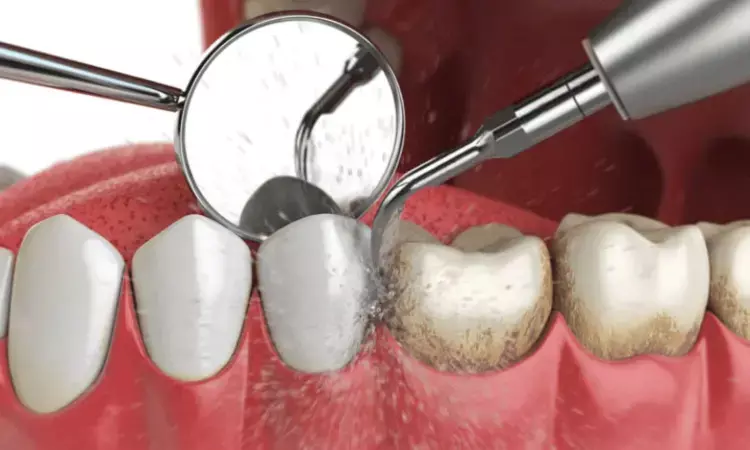- Home
- Medical news & Guidelines
- Anesthesiology
- Cardiology and CTVS
- Critical Care
- Dentistry
- Dermatology
- Diabetes and Endocrinology
- ENT
- Gastroenterology
- Medicine
- Nephrology
- Neurology
- Obstretics-Gynaecology
- Oncology
- Ophthalmology
- Orthopaedics
- Pediatrics-Neonatology
- Psychiatry
- Pulmonology
- Radiology
- Surgery
- Urology
- Laboratory Medicine
- Diet
- Nursing
- Paramedical
- Physiotherapy
- Health news
- Fact Check
- Bone Health Fact Check
- Brain Health Fact Check
- Cancer Related Fact Check
- Child Care Fact Check
- Dental and oral health fact check
- Diabetes and metabolic health fact check
- Diet and Nutrition Fact Check
- Eye and ENT Care Fact Check
- Fitness fact check
- Gut health fact check
- Heart health fact check
- Kidney health fact check
- Medical education fact check
- Men's health fact check
- Respiratory fact check
- Skin and hair care fact check
- Vaccine and Immunization fact check
- Women's health fact check
- AYUSH
- State News
- Andaman and Nicobar Islands
- Andhra Pradesh
- Arunachal Pradesh
- Assam
- Bihar
- Chandigarh
- Chattisgarh
- Dadra and Nagar Haveli
- Daman and Diu
- Delhi
- Goa
- Gujarat
- Haryana
- Himachal Pradesh
- Jammu & Kashmir
- Jharkhand
- Karnataka
- Kerala
- Ladakh
- Lakshadweep
- Madhya Pradesh
- Maharashtra
- Manipur
- Meghalaya
- Mizoram
- Nagaland
- Odisha
- Puducherry
- Punjab
- Rajasthan
- Sikkim
- Tamil Nadu
- Telangana
- Tripura
- Uttar Pradesh
- Uttrakhand
- West Bengal
- Medical Education
- Industry
Research sheds light on efficacy of combining adjuvants with non-surgical periodontal therapy in patients with type 2 diabetes

Brazil: A Bayesian network meta-analysis published in the Journal of Clinical Periodontology has shed light on the efficacy of combining adjuvants with non-surgical periodontal therapy in patients with type 2 diabetes (T2D).
Fabrício Batistin Zanatta and colleagues from Brazil revealed that the adjuvant use of metronidazole or alpha lipoic acid was the best adjunct option to provide clinically meaningful HbA1c levels and probing depth reductions.
"However, no strong recommendation can be drawn due to the lack of studies for each adjuvant treatment and the low certainty of the resultant evidence," they wrote.
Periodontitis is a chronic inflammatory disease caused by pathogens in the surrounding periodontal tissues leading to periodontal pocket formation, clinical attachment loss and alveolar bone resorption and ultimately leads to tooth loss. It is well-known that periodontitis is highly associated with T2D, and now periodontitis is regarded as the sixth complicated form of T2D. Compared to nondiabetics, patients with diabetes present worse clinical manifestations of periodontitis. Besides, moderate to severe periodontitis raises the risk of type 2 diabetes leading to poor glycemic control in diabetics.
Glycemic control is vital in the care of type 2 diabetes and is significantly associated with the incidence of clinical complications. Previous studies suggest that scaling and root planing (SRP) or SRP plus adjuvant treatment could improve glycemic control in patients with type 2 diabetes and chronic periodontitis, but no effective conclusion has been drawn regarding the best treatment. Besides, evidence is conflicting regarding glycemic control of various adjuvant treatments in SRP.
Against the above background, the research team assessed the effect of adjuvant periodontal treatment in both periodontal and HbA1c outcomes in adult type 2 diabetes patients using the Bayesian network meta-analysis of randomized controlled trials (RCTs).
For this purpose, they conducted a systematic search up to February 2023 comparing sub-gingival debridement (SD) in combination with local or systemic adjuvant treatment with SD alone for individuals with type 2 diabetes. The study's primary outcomes were changes in absolute HbA1c levels and full-mouth probing depth reported at 3- to 6-month post-treatment.
The researchers retrieved seventy-two eligible publications evaluating 27 adjuvant treatments. Based on the meta-analysis, the researchers reported the following findings:
- The combination of SD and systemic antibiotic metronidazole or SD and antioxidant alpha lipoic acid provided, respectively, 1.4% and 2.4% more significant improvement in HbA1c levels, and 0.89 mm and 0.92 mm greater periodontal probing depth reductions.
- Other adjuvant treatments provided added benefit to the periodontal outcomes without discernible effects on HbA1c.
"Adjuvant use of alpha lipoic acid or metronidazole was the best adjunct option to provide clinically meaningful HbA1c levels and probing depth reductions," the researchers wrote. Adding that, "no strong recommendation can be drawn due to the lack of studies for each adjuvant treatment and the low certainty of the resultant evidence."
Reference:
Zanatta, F. B., Antoniazzi, R. P., Oliveira, L. M., Lietzan, A. D., Miguez, P. A., & Susin, C. The efficacy of combining adjuvants with non-surgical periodontal therapy in individuals with type 2 diabetes: A Bayesian network meta-analysis. Journal of Clinical Periodontology. https://doi.org/10.1111/jcpe.13946
Dr Kamal Kant Kohli-MBBS, DTCD- a chest specialist with more than 30 years of practice and a flair for writing clinical articles, Dr Kamal Kant Kohli joined Medical Dialogues as a Chief Editor of Medical News. Besides writing articles, as an editor, he proofreads and verifies all the medical content published on Medical Dialogues including those coming from journals, studies,medical conferences,guidelines etc. Email: drkohli@medicaldialogues.in. Contact no. 011-43720751


